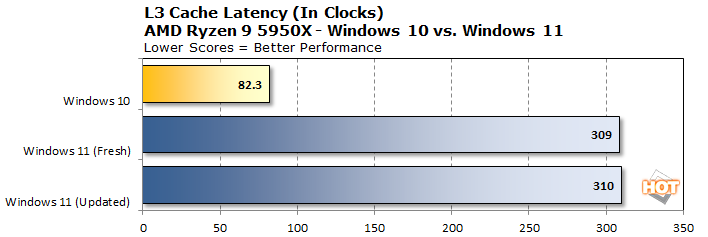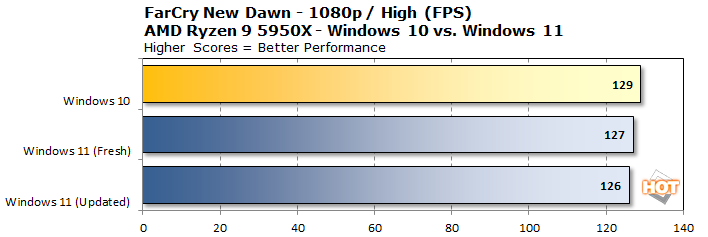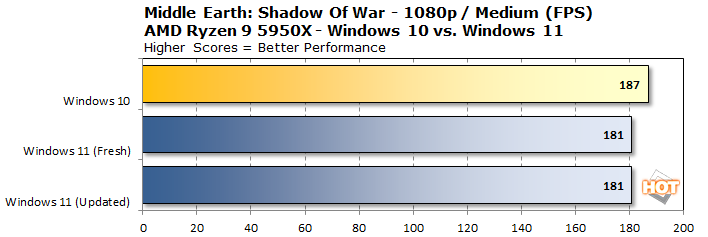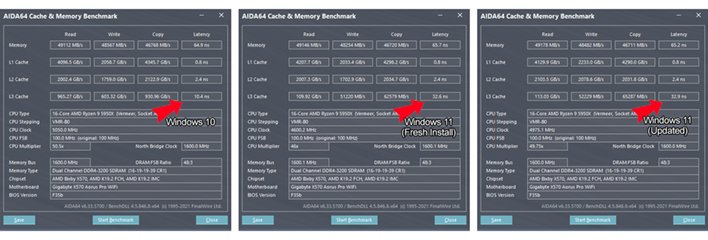Much has been made about the performance impact of Windows 11 on AMD Ryzen systems, due to a
pair of acknowledged bugs that AMD and Microsoft are scrambling to resolve. Patches are supposed to arrive this month, though no firm release date has been announced. In the meantime, we decided to run some tests to see just how much performance Ryzen users stand to lose by upgrading to Windows 11 before the bugs are squashed.
We'll get to the numbers in a moment, but first let's recap the issues at hand. One of the bugs is throwing L3 cache latency out of whack on Ryzen and EPYC processors. In a support article, AMD said applications sensitive to memory subsystem access time may be impacted, with an estimated performance loss of up to 5 percent. AMD also said there could be "possible outliers in some games."
The other bug is screwing with thread scheduling, causing some applications to not run on a processor's fastest core. Apparently, this is only detectable on Ryzen processors with more than eight physical cores and above 65W, putting the
Ryzen 7 5800X right on the line.
According to AMD, a Windows update is in development to address the L3 latency issue, and a software update is in the works for the latter bug. Both are due out sometime this month (Microsoft already released its first
Patch Tuesday update for Windows 11, which reportedly gimped performance even further, so we're looking at an out-of-band release).
Testing AMD Ryzen Performance In Windows 11 And Windows 10
So, what kind of performance impact are we looking at here? Due to time constraints, we tested the performance of a single, high-end AMD Ryzen processor that we had ready to go, in Windows 10 and Windows 11 (AMD's flagship Zen 3 CPU, the
Ryzen 9 5950X). Here's our test setup…
- AMD Ryzen 9 5950X
- 32GB DDR4-3200
- Gigabyte Aorus X570 Pro WiFi
- AMD Radeon RX 6700 XT
Our test bed is updated with the latest BIOS and chipset drivers, and we also have Resizable Bar (Smart Access Memory) enabled. As for the OSes, we ran some benchmarks in fully updated versions of Windows 10 and Windows 11 (installed from the official ISO, 22000.258).
 Click to Enlarge
Click to Enlarge
So right off the bat, things don't look pretty. And that's putting it mildly. Everything is hunky-dory until we direct our gaze at the L3 cache results. In Windows 10, our Ryzen 9 5950X records a latency of 10.4ns, along with a 965.27GB/s read metric, 603.32GB/s write, and 930.96GB/s copy.
Those all take a nose dive in Windows 11, both from a fresh install and after updating. After applying the Patch Tuesday update, the latency shoots up to 32.9ns (+216%). Meanwhile, the read benchmark drops to 113.03GB/s (-88.3%), write drops to 52,229MB/s (-91.3%), and copy plummets to 65,287MB/s (-93%). Ouch.
SiSoftware's SANDRA benchmark shows more of the same, as outlined in the graph above. There's no real difference in Windows 11 from a fresh install to after applying the Patch Tuesday update, but there's quite a big hit in going from Windows 10 to Windows 11.
Synthetic testing out of the way, let's pivot to a couple of games...
Well, there's the sliver lining. Depending on the game, there's virtually no performance impact. At least that is the case we observed in Far Cry New Dawn, at 1080p. There was a slight drop, from 129 frames per second to 126 frames per second, but nothing that would be perceptible.
Similar story played out in Middle Earth: Shadow of War. At 1080p, the average frame rate dipped ever-so-slightly from 187 fps to 181 fps. That's a 3.2% dip, though again, that's not anything that would be perceptible during actual gameplay.
Bear in mind that this is a limited outlook. There are reports of bigger hits in gaming, depending on the title and processor. So this is by no means a comprehensive evaluation of the bug, but a quick and dirty peek. That said, if patches don't arrive soon, perhaps we'll widen our scope as time allows.
For now, the general takeaway is that something definitely is amiss, which can have a sizable or negligible impact on performance.
Update: 10/15/2021, 4:22 PM - It looks like Microsoft already has a fix on this cache latency bug and has it loaded up on the
Windows 11 Release Preview Channel. Hopefully it'll be rolling out on the Windows Update service early next week.






